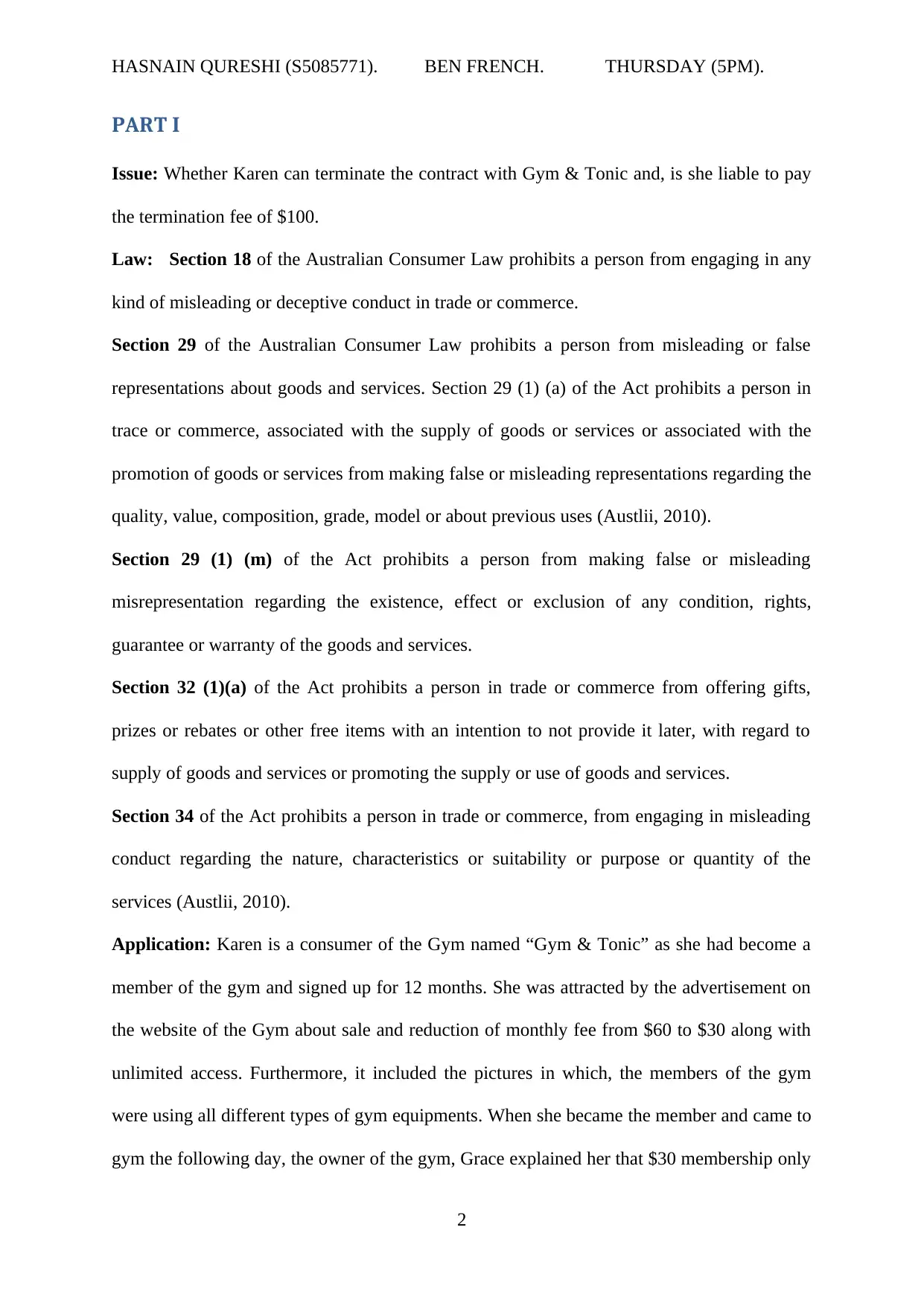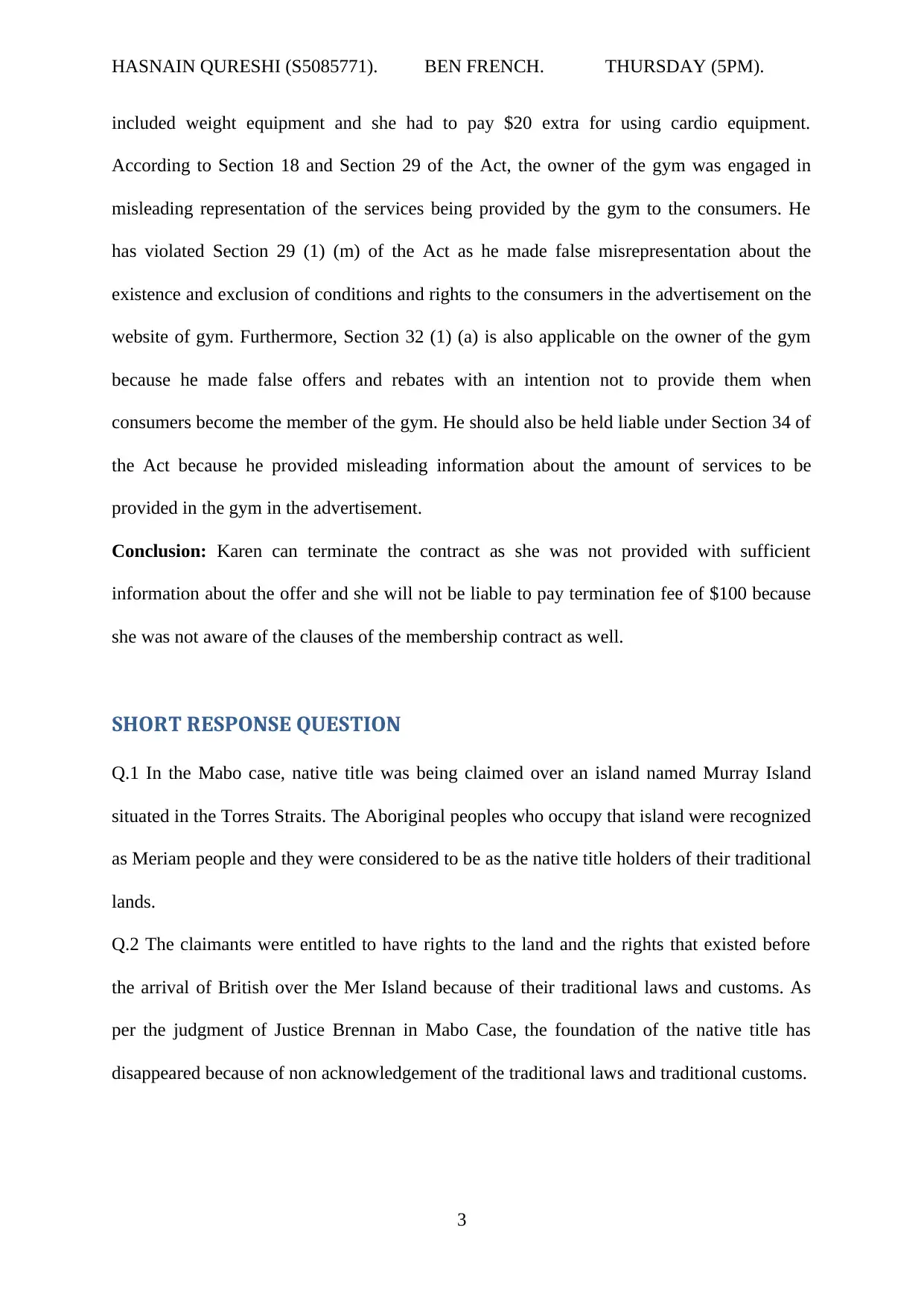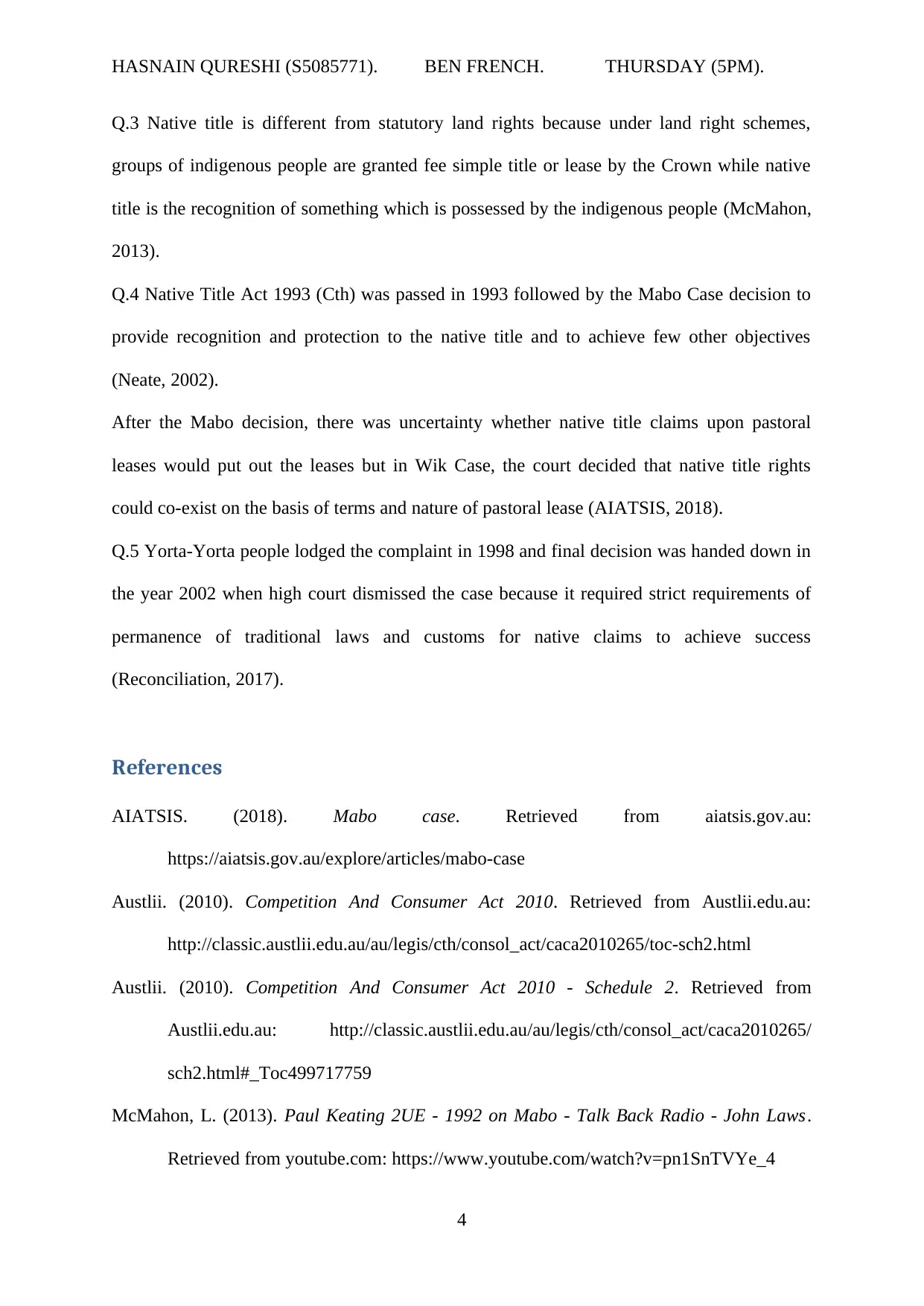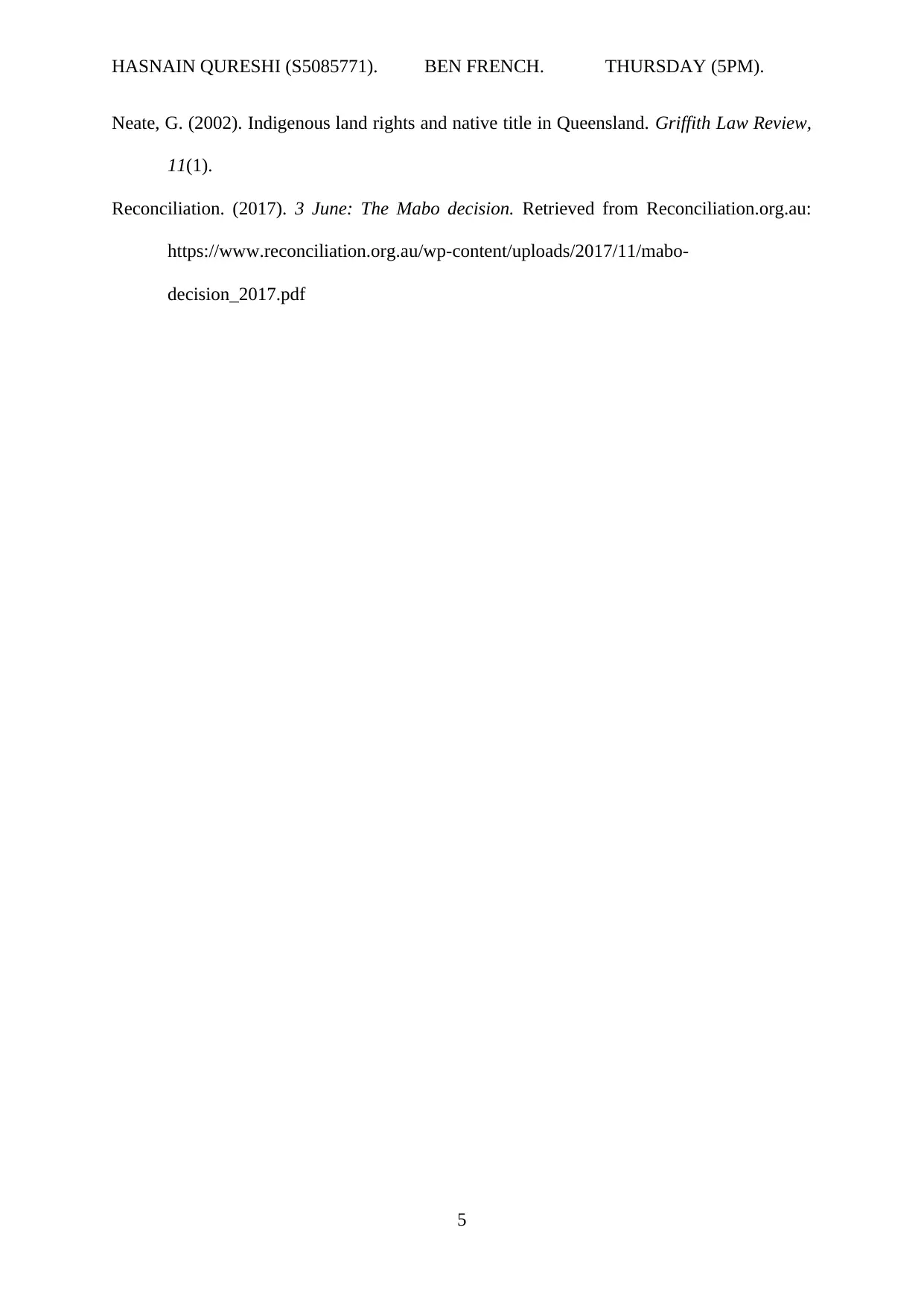Consumer Rights: Gym & Tonic Contract Termination - Case Study
VerifiedAdded on 2023/06/07
|5
|1127
|371
Case Study
AI Summary
This assignment presents a case study involving Karen, a consumer who signed a 12-month gym membership with "Gym & Tonic." Karen seeks to terminate her contract due to misleading representations made by the gym regarding the services included in the advertised monthly fee. The analysis applies relevant sections of the Australian Consumer Law (ACL), including Section 18 (misleading conduct), Section 29 (false representations about goods and services), Section 32 (offering gifts or rebates without intent to provide), and Section 34 (misleading conduct regarding services). The conclusion supports Karen's right to terminate the contract without incurring a termination fee, as the gym engaged in deceptive practices. The assignment also includes short response questions related to the Mabo case, native title, and the Native Title Act 1993 (Cth), discussing key legal concepts and historical context surrounding Indigenous land rights in Australia. The document is contributed by a student and available on Desklib, a platform offering study tools and resources for students.

HASNAIN QURESHI (S5085771). BEN FRENCH. THURSDAY (5PM).
Table of Contents
PART I.......................................................................................................................................3
SHORT RESPONSE QUESTION.............................................................................................4
References..................................................................................................................................5
1
Table of Contents
PART I.......................................................................................................................................3
SHORT RESPONSE QUESTION.............................................................................................4
References..................................................................................................................................5
1
Paraphrase This Document
Need a fresh take? Get an instant paraphrase of this document with our AI Paraphraser

HASNAIN QURESHI (S5085771). BEN FRENCH. THURSDAY (5PM).
PART I
Issue: Whether Karen can terminate the contract with Gym & Tonic and, is she liable to pay
the termination fee of $100.
Law: Section 18 of the Australian Consumer Law prohibits a person from engaging in any
kind of misleading or deceptive conduct in trade or commerce.
Section 29 of the Australian Consumer Law prohibits a person from misleading or false
representations about goods and services. Section 29 (1) (a) of the Act prohibits a person in
trace or commerce, associated with the supply of goods or services or associated with the
promotion of goods or services from making false or misleading representations regarding the
quality, value, composition, grade, model or about previous uses (Austlii, 2010).
Section 29 (1) (m) of the Act prohibits a person from making false or misleading
misrepresentation regarding the existence, effect or exclusion of any condition, rights,
guarantee or warranty of the goods and services.
Section 32 (1)(a) of the Act prohibits a person in trade or commerce from offering gifts,
prizes or rebates or other free items with an intention to not provide it later, with regard to
supply of goods and services or promoting the supply or use of goods and services.
Section 34 of the Act prohibits a person in trade or commerce, from engaging in misleading
conduct regarding the nature, characteristics or suitability or purpose or quantity of the
services (Austlii, 2010).
Application: Karen is a consumer of the Gym named “Gym & Tonic” as she had become a
member of the gym and signed up for 12 months. She was attracted by the advertisement on
the website of the Gym about sale and reduction of monthly fee from $60 to $30 along with
unlimited access. Furthermore, it included the pictures in which, the members of the gym
were using all different types of gym equipments. When she became the member and came to
gym the following day, the owner of the gym, Grace explained her that $30 membership only
2
PART I
Issue: Whether Karen can terminate the contract with Gym & Tonic and, is she liable to pay
the termination fee of $100.
Law: Section 18 of the Australian Consumer Law prohibits a person from engaging in any
kind of misleading or deceptive conduct in trade or commerce.
Section 29 of the Australian Consumer Law prohibits a person from misleading or false
representations about goods and services. Section 29 (1) (a) of the Act prohibits a person in
trace or commerce, associated with the supply of goods or services or associated with the
promotion of goods or services from making false or misleading representations regarding the
quality, value, composition, grade, model or about previous uses (Austlii, 2010).
Section 29 (1) (m) of the Act prohibits a person from making false or misleading
misrepresentation regarding the existence, effect or exclusion of any condition, rights,
guarantee or warranty of the goods and services.
Section 32 (1)(a) of the Act prohibits a person in trade or commerce from offering gifts,
prizes or rebates or other free items with an intention to not provide it later, with regard to
supply of goods and services or promoting the supply or use of goods and services.
Section 34 of the Act prohibits a person in trade or commerce, from engaging in misleading
conduct regarding the nature, characteristics or suitability or purpose or quantity of the
services (Austlii, 2010).
Application: Karen is a consumer of the Gym named “Gym & Tonic” as she had become a
member of the gym and signed up for 12 months. She was attracted by the advertisement on
the website of the Gym about sale and reduction of monthly fee from $60 to $30 along with
unlimited access. Furthermore, it included the pictures in which, the members of the gym
were using all different types of gym equipments. When she became the member and came to
gym the following day, the owner of the gym, Grace explained her that $30 membership only
2

HASNAIN QURESHI (S5085771). BEN FRENCH. THURSDAY (5PM).
included weight equipment and she had to pay $20 extra for using cardio equipment.
According to Section 18 and Section 29 of the Act, the owner of the gym was engaged in
misleading representation of the services being provided by the gym to the consumers. He
has violated Section 29 (1) (m) of the Act as he made false misrepresentation about the
existence and exclusion of conditions and rights to the consumers in the advertisement on the
website of gym. Furthermore, Section 32 (1) (a) is also applicable on the owner of the gym
because he made false offers and rebates with an intention not to provide them when
consumers become the member of the gym. He should also be held liable under Section 34 of
the Act because he provided misleading information about the amount of services to be
provided in the gym in the advertisement.
Conclusion: Karen can terminate the contract as she was not provided with sufficient
information about the offer and she will not be liable to pay termination fee of $100 because
she was not aware of the clauses of the membership contract as well.
SHORT RESPONSE QUESTION
Q.1 In the Mabo case, native title was being claimed over an island named Murray Island
situated in the Torres Straits. The Aboriginal peoples who occupy that island were recognized
as Meriam people and they were considered to be as the native title holders of their traditional
lands.
Q.2 The claimants were entitled to have rights to the land and the rights that existed before
the arrival of British over the Mer Island because of their traditional laws and customs. As
per the judgment of Justice Brennan in Mabo Case, the foundation of the native title has
disappeared because of non acknowledgement of the traditional laws and traditional customs.
3
included weight equipment and she had to pay $20 extra for using cardio equipment.
According to Section 18 and Section 29 of the Act, the owner of the gym was engaged in
misleading representation of the services being provided by the gym to the consumers. He
has violated Section 29 (1) (m) of the Act as he made false misrepresentation about the
existence and exclusion of conditions and rights to the consumers in the advertisement on the
website of gym. Furthermore, Section 32 (1) (a) is also applicable on the owner of the gym
because he made false offers and rebates with an intention not to provide them when
consumers become the member of the gym. He should also be held liable under Section 34 of
the Act because he provided misleading information about the amount of services to be
provided in the gym in the advertisement.
Conclusion: Karen can terminate the contract as she was not provided with sufficient
information about the offer and she will not be liable to pay termination fee of $100 because
she was not aware of the clauses of the membership contract as well.
SHORT RESPONSE QUESTION
Q.1 In the Mabo case, native title was being claimed over an island named Murray Island
situated in the Torres Straits. The Aboriginal peoples who occupy that island were recognized
as Meriam people and they were considered to be as the native title holders of their traditional
lands.
Q.2 The claimants were entitled to have rights to the land and the rights that existed before
the arrival of British over the Mer Island because of their traditional laws and customs. As
per the judgment of Justice Brennan in Mabo Case, the foundation of the native title has
disappeared because of non acknowledgement of the traditional laws and traditional customs.
3
⊘ This is a preview!⊘
Do you want full access?
Subscribe today to unlock all pages.

Trusted by 1+ million students worldwide

HASNAIN QURESHI (S5085771). BEN FRENCH. THURSDAY (5PM).
Q.3 Native title is different from statutory land rights because under land right schemes,
groups of indigenous people are granted fee simple title or lease by the Crown while native
title is the recognition of something which is possessed by the indigenous people (McMahon,
2013).
Q.4 Native Title Act 1993 (Cth) was passed in 1993 followed by the Mabo Case decision to
provide recognition and protection to the native title and to achieve few other objectives
(Neate, 2002).
After the Mabo decision, there was uncertainty whether native title claims upon pastoral
leases would put out the leases but in Wik Case, the court decided that native title rights
could co-exist on the basis of terms and nature of pastoral lease (AIATSIS, 2018).
Q.5 Yorta-Yorta people lodged the complaint in 1998 and final decision was handed down in
the year 2002 when high court dismissed the case because it required strict requirements of
permanence of traditional laws and customs for native claims to achieve success
(Reconciliation, 2017).
References
AIATSIS. (2018). Mabo case. Retrieved from aiatsis.gov.au:
https://aiatsis.gov.au/explore/articles/mabo-case
Austlii. (2010). Competition And Consumer Act 2010. Retrieved from Austlii.edu.au:
http://classic.austlii.edu.au/au/legis/cth/consol_act/caca2010265/toc-sch2.html
Austlii. (2010). Competition And Consumer Act 2010 - Schedule 2. Retrieved from
Austlii.edu.au: http://classic.austlii.edu.au/au/legis/cth/consol_act/caca2010265/
sch2.html#_Toc499717759
McMahon, L. (2013). Paul Keating 2UE - 1992 on Mabo - Talk Back Radio - John Laws.
Retrieved from youtube.com: https://www.youtube.com/watch?v=pn1SnTVYe_4
4
Q.3 Native title is different from statutory land rights because under land right schemes,
groups of indigenous people are granted fee simple title or lease by the Crown while native
title is the recognition of something which is possessed by the indigenous people (McMahon,
2013).
Q.4 Native Title Act 1993 (Cth) was passed in 1993 followed by the Mabo Case decision to
provide recognition and protection to the native title and to achieve few other objectives
(Neate, 2002).
After the Mabo decision, there was uncertainty whether native title claims upon pastoral
leases would put out the leases but in Wik Case, the court decided that native title rights
could co-exist on the basis of terms and nature of pastoral lease (AIATSIS, 2018).
Q.5 Yorta-Yorta people lodged the complaint in 1998 and final decision was handed down in
the year 2002 when high court dismissed the case because it required strict requirements of
permanence of traditional laws and customs for native claims to achieve success
(Reconciliation, 2017).
References
AIATSIS. (2018). Mabo case. Retrieved from aiatsis.gov.au:
https://aiatsis.gov.au/explore/articles/mabo-case
Austlii. (2010). Competition And Consumer Act 2010. Retrieved from Austlii.edu.au:
http://classic.austlii.edu.au/au/legis/cth/consol_act/caca2010265/toc-sch2.html
Austlii. (2010). Competition And Consumer Act 2010 - Schedule 2. Retrieved from
Austlii.edu.au: http://classic.austlii.edu.au/au/legis/cth/consol_act/caca2010265/
sch2.html#_Toc499717759
McMahon, L. (2013). Paul Keating 2UE - 1992 on Mabo - Talk Back Radio - John Laws.
Retrieved from youtube.com: https://www.youtube.com/watch?v=pn1SnTVYe_4
4
Paraphrase This Document
Need a fresh take? Get an instant paraphrase of this document with our AI Paraphraser

HASNAIN QURESHI (S5085771). BEN FRENCH. THURSDAY (5PM).
Neate, G. (2002). Indigenous land rights and native title in Queensland. Griffith Law Review,
11(1).
Reconciliation. (2017). 3 June: The Mabo decision. Retrieved from Reconciliation.org.au:
https://www.reconciliation.org.au/wp-content/uploads/2017/11/mabo-
decision_2017.pdf
5
Neate, G. (2002). Indigenous land rights and native title in Queensland. Griffith Law Review,
11(1).
Reconciliation. (2017). 3 June: The Mabo decision. Retrieved from Reconciliation.org.au:
https://www.reconciliation.org.au/wp-content/uploads/2017/11/mabo-
decision_2017.pdf
5
1 out of 5
Related Documents
Your All-in-One AI-Powered Toolkit for Academic Success.
+13062052269
info@desklib.com
Available 24*7 on WhatsApp / Email
![[object Object]](/_next/static/media/star-bottom.7253800d.svg)
Unlock your academic potential
Copyright © 2020–2025 A2Z Services. All Rights Reserved. Developed and managed by ZUCOL.





